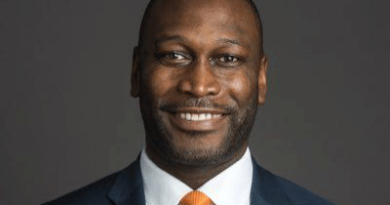Health Care Experts: Go Back to the Basics
The health care expert also went over some cost containment strategies for employers, such as defined contributions, which can be budgeted well, health reimbursement arrangements (HRAs) or even professional employer organizations (PEOs), which allows a small business to partner with a larger company to offer more comprehensive coverage.
Vincent Blasi of Vanguard Insurance, who spoke about cost reduction, said what employers need to provide insurance for their employees is something that’s affordable.
At Vanguard Insurance, a consulting agency, Blasi said they work with clients to offer solutions to stabilize the cost of health insurance and stay in compliance.
“What we’re trying to do is put you in a position to be the employer of choice,” he said. “We know how difficult it is to attract and retain employees.”
Strategies for reducing costs differ for big and small companies. But Blasi said no matter the type of company, employees have to understand what services they’re entitled to.
It’s then incumbent on the employer or their broker to sit down with employees and communicate that to them.
“Everyone has a different medical need and everybody has a different budget,” Blasi said. “We have to really sit down with them one-on-one, and tell them we’re willing to do that if they’re willing to take the time.
“The days of enrolling into a plan are long gone. You really need that consumerism on the employee side, to be educated,” he added. “You really have to be more involved than ever. You can’t just go in and check a box.”
Bert Lurch, president of the Health Business Alliance, said health care consumers have to be savvy because that translates into saving money. He noted that unless you work in the health care industry, the average person doesn’t know all about their coverage.
When receiving an Explanation of Benefits, Lurch advised attendees to read the explanation, and to ask questions when there’s something you don’t understand.
He also recommended reading every contract, requesting a receipt for payments made and always answering collections bills.
“If you don’t question it, you don’t know, and that gets you in a situation,” he said.
Lurch added that employers should want employees to be empowered so they can have a better experience with the health care system as well.
Shakira Gordon, vice president of human resources at St. John’s Episcopal, contributed her expertise on the administrative side of health care. She advised employers to not only administer plans legally and on deadline, but also to write information down.
“It’s difficult to have a one-time conversation and expect people to remember or understand all of that information,” she said. “So having an actual document they can refer to is a requirement as well.”
Having a person in your organization dedicated to benefit administration or using a brokerage firm can help make sure all of the information goes out on time, she said.
Gordon also suggested having a system of “checks and balances” so that the company is meeting all of its deadlines and keeping up with regulations. Even St. John’s, which has a benefits officer, hires a broker just in case.
“Have your own internal checks and balances, some way you can audit yourself before an external agency has to audit you,” she said. “I know for a smaller organization that may not always be possible, but having a professional to ensure that your benefits are administered properly is always a good thing.”






